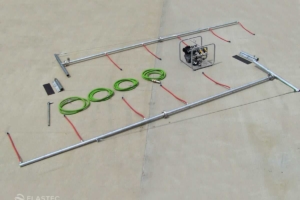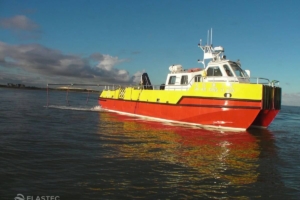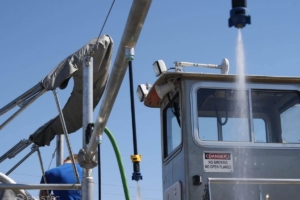ELASPRAY
ElaSpray is a portable dispersant spraying system for oil spill response operations. It is designed for easy installation on tugboats and other types of vessels. The system contains a compact diesel engine driven pump for spraying diluted or neat dispersant. Read our Frequently Asked Questions.
The ElaSpray system is mounted in a stainless steel frame with a set of two marine-grade aluminum spray arms on a supporting post and secured by the topping wires. Each spray arm is mounted with 5 spray nozzles.
The dispersant spray arms are typically mounted toward the bow of the vessel. This allows the chemical to be applied on oil undisturbed by the bow wave. The nozzle height is adjusted once the arms are installed by altering the downtube length. This is to ensure that an even spray pattern is achieved on the water. Various spray arm lengths are available to suit the vessel.
The ElaSpray oil spill dispersant spray system is supplied with suction / discharge hoses and plates ready to mount on the vessel to support the arms.
Contact us to learn more.
Oil Dispersant Application System Frequently Asked Questions
What is an oil spill dispersant?
“Dispersants” as they are known generically are low toxicity chemicals that are used to break up oil on the surface of the water and promote natural degradation. They are a tool used alongside mechanical recovery and in-situ burning.
When are dispersants used?
Dispersant is typically used in large scale incidents offshore when other means are limited. Responders will go through a net environmental benefit analysis.
Where is it used?
Dispersant is not typically used in shallow or inland waters.
How is it applied?
Dispersant has to be sprayed in the correct manner to ensure effectiveness. It may be sprayed from aircraft or ships.
Does dispersant usage have to be approved?
Yes. The use of oil dispersants is regulated in most countries. Not only does the use need to be approved, the chemical itself has to undergo testing for toxicity and effectiveness.
Products Available for Use During an Oil Spill
Dispersant use approvals in the United States
What dispersant spray systems does Elastec offer?
We have three different systems, Elaspray is a conventional pump and arm setup, with arms that are mounted to the side of a ship. The Neatsweep is more precise as oil is funneled to a channel where the oil dispersant is applied ( dosage automatically adjusts to the speed of the vessel ), and the Boom Vane Spray (BVS). The BVS system enables vessels to get closer to shore with a wider swath than arms.
ASTM Standards for Oil Spill Dispersants
The following links offer information related to ASTM International standards for oil spill dispersants.
- F1209-19 Standard Guide for Ecological Considerations for the Use of Oil Spill Dispersants in Freshwater and Other Inland Environments, Ponds and Sloughs
- F1210-19 Standard Guide for Ecological Considerations for the Use of Oil Spill Dispersants in Freshwater and Other Inland Environments, Lakes and Large Water Bodies
- F1231-19 Standard Guide for Ecological Considerations for the Use of Oil Spill Dispersants in Freshwater and Other Inland Environments, Rivers and Creeks
- F1413/F1413M-18 Standard Guide for Oil Spill Dispersant Application Equipment: Boom and Nozzle Systems
- F1460/F1460M-18 Standard Practice for Calibrating Oil Spill Dispersant Application Equipment Boom and Nozzle Systems
- F1737/F1737M-19 Standard Guide for Use of Oil Spill Dispersant Application Equipment During Spill Response: Boom and Nozzle Systems
- F1738-19 Standard Test Method for Determination of Deposition of Aerially Applied Oil Spill Dispersants
- F1872-17 Standard Guide for Use of Chemical Shoreline Cleaning Agents: Environmental and Operational Considerations
- F2059-17 Standard Test Method for Laboratory Oil Spill Dispersant Effectiveness Using the Swirling Flask
- F2205-19 Standard Guide for Ecological Considerations for the Use of Chemical Dispersants in Oil Spill Response: Tropical Environments
- F2465/F2465M-20 Standard Guide for Oil Spill Dispersant Application Equipment: Single-point Spray Systems
- F2532-19 Standard Guide for Determining Net Environmental Benefit of Dispersant Use
- F3251-17 Standard Test Method for Laboratory Oil Spill Dispersant Effectiveness Using the Baffled Flask


